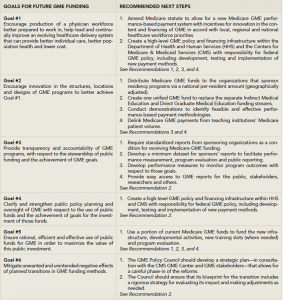Congress, however, seems to be leaning in a different direction—siding more closely with the IOM recommendations. With Republicans surging to majorities in both the House and Senate in the 2014 mid-term elections, GOP leaders have pledged to use the budgeting process to scale back the GME program.2

(Click for larger image)
Table 1: Goals & Recommended Next Steps for Reforming
Medicare Graduate Medical Education (GME) Governance & Financing.
Source: Graduate Medical Education That Meets the Nation’s Health Needs, Institute of Medicine, July 29, 2014
Dr. Lohr, who is a member of the ACR’s Committee on Rheumatology Training and Workforce Issues and has been teaching residents since the 1980s, says she has “mixed feelings” about the IOM recommendations. She disagrees with “diverting” existing monies to create new programs and bureaucracies, but a number of the IOM’s suggestions resonate with the training community.
“We need stability and flexibility in funding to be able to plan for the future and deal with changes in the healthcare environment,” she says. “Incentives for working in identified shortage areas are key. The ability to be flexible, to meet fluxes in provider shortages, and patient access issues are key.
“Regarding those who train, ACGME and specialty/subspecialty boards need to be involved to ensure that trainees in rural vs. urban areas meet the highest standards of care—and continue to maintain those standards.”
Dr. Lohr says she “cringes a bit” at the idea of performance-based GME funding. With no details on what that means and a training community fresh off major changes in resident-duty hours, she worries that could mean “clicking more boxes” in electronic health records.
However, she does think a few of the IOM’s suggested goals and next steps could benefit rheumatologists and their patients. The first two goals address a better prepared and “continually evolving” physician workforce, and “encourage innovation in the structure, location and design” of GME programs.
“Those goals (and recommended next steps) might lead to true team-based care,” she says. “Having true team-based care in the ambulatory setting would be superb. To provide complete care to patients with chronic pain or fibromyalgia, for example, the team should include social workers, psychologists and PharmDs.
“Right now, we don’t have them in our clinic because there is no financial mechanism to pay for them. Delinking Medicare GME payments from teaching institutions’ Medicare patient volume sounds promising.”
Before any of the recommendations or next steps come to fruition, Congress would have to act. Many pundits think that the potential friction with a healthcare industry still reeling from the changes from the Affordable Care Act isn’t worth the trouble, and that the status quo is just fine. Wilensky says that kind of thinking is short-sighted.
